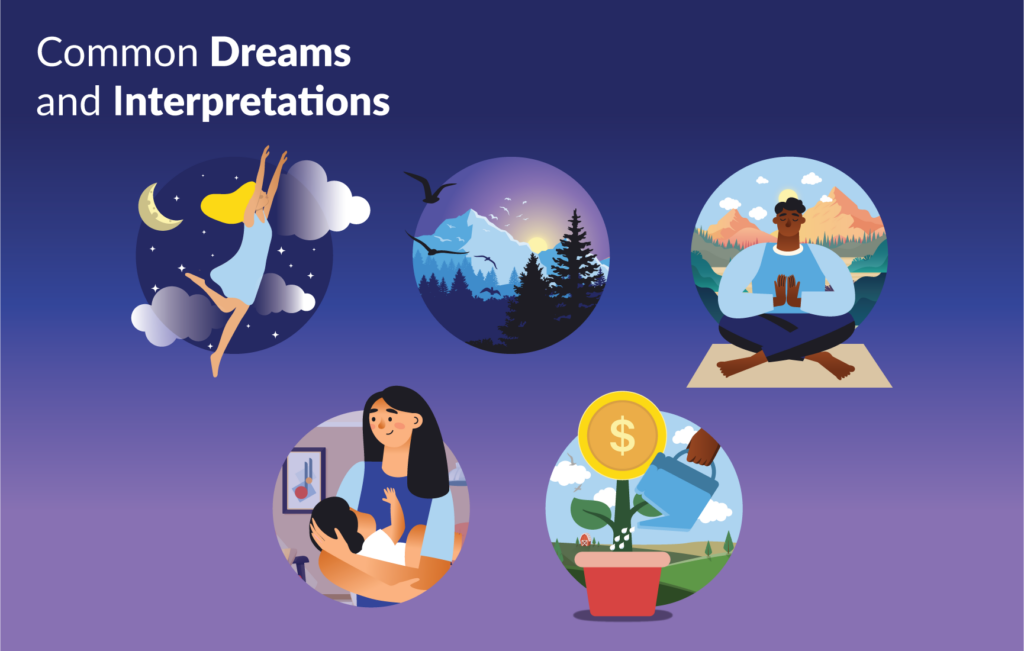
What do your dreams mean? Even though only about 80 percent of us remember the unconscious thoughts and images that play across our minds while we sleep, everyone dreams. (1) If you ever wake up wondering what on earth your last dream was all about — or even how to interpret dreams — some experts think they have the answer.
Dream interpretation has changed a lot over the millennia, but these days, psychoanalysts say they can use your dreams to help you address and process real-life events and emotions. (2) Below, we’ll give you the details on why you dream, what they could mean, and how you can decode these nocturnal experiences.
Long Story Short
- Dreaming may help you process events and emotions from the day, boost your creative problem solving, and cement your memories.
- Many cultures have used dream interpretation over the centuries, but now experts believe dreams have unique meaning for each dreamer.
- You can start decoding your dreams by keeping a dream journal, going to bed with the intention to remember your dreams, and consulting a mental health professional.
What Are Dreams?
When you dream, you are asleep, but your brain acts like it’s awake. During dreams, you may feel completely immersed in an experience, with all your senses making you feel as though you’ve been transported to another place or time. (3)
Dreams typically occur in one particular sleep stage: rapid-eye movement (REM) sleep. During REM sleep your brain is active, similar to when you’re awake, says Joel Frank, PsyD, clinical psychologist and neuropsychologist at Duality Psychological Services, who has experience interpreting dreams with his clients. (4)
Different parts of your brain work together to weave your vivid dreams, with one part organizing what you dream about, and another generating the detailed images you see in dreamland, says Frank. (5) (6)
“The exact purposes of dreams and nightmares are still debated, but several theorists have attempted to explain why people dream,” says Frank. (7) One theory with strong support in the research suggests dreams seem to provide a continuation of your daily life events. (8) For example, if you’re stressed about a looming project at work, you may dream about it at night.
Experts say dreams do a lot of good for you, helping you process memories and emotions, solve tough problems, and make time for self-reflection. (6) (8) More on how dreams may help us below!
Memory Processing
“One widely accepted theory suggests that dreams play a crucial role in processing and organizing memories,” says Frank. As you dream, you replay experiences from the day, which may help you store the information you need and flush out the memories you don’t. (9)
Dealing with Emotions and Stressors
Dreams may also help people process emotions and psychological stress, says Frank. “By simulating real-life scenarios and emotions, our minds can work through unresolved issues, fears, and anxieties in a safe environment.” Dreams may give us some context for our emotions and help us cope with them, too. (9)
Creative Problem-Solving
Some experts think that dreams give your brain space for creative problem-solving, says Frank. “In the dream state, the brain can explore novel ideas and solutions without the constraints of reality, potentially leading to innovative thinking and insights.” (8)
Self-Reflection
Other research suggests dreams may help you reorient your sense of self. (6) “[Dreams] allow people to explore different aspects of their personalities and subconscious minds, often bringing hidden desires, conflicts, and motivations to light,” says Frank.
The History of Dream Interpretation
“Dreams are a complex phenomenon that has intrigued humans for centuries,” says Frank. Experts say at least 4,000 years ago, ancient civilizations like the early Mesopotamians and Egyptians put a lot of stock in dream interpretation. (9)
Christian and Jewish writings from 2,000 years ago also talk about the meaning of dreams, followed by Greek philosophers, early Buddhist and Hindu texts, and even Islamic scholars. (9)
In the late 1890s, Sigmund Freud, the founder of psychoanalysis, published his famous work, The Interpretation of Dreams, which connected certain objects or dream events with specific meanings. (8) (10)
Since then, researchers have kept studying dreams and what they mean, finding better and more accurate methods for decoding dreams. (8) Now we have over 150 dream rating and analysis tools used by psychoanalysts to interpret dreams. (8)
These days, experts have moved away from the dream interpretation model in which the same dream events or symbols hold the same meaning from everyone. Now, dream interpretation is much more nuanced, and each person’s dreams may tell them something specific about their life experiences. (2)
Interpretations of Common Dreams and Symbols
Modern science has nudged aside the universal symbolism of dreams, putting more focus on thematic interpretation for the dreamer’s life. (2) But, even though these common symbols don’t hold water in the science community, it can still be fun to see what common dream symbols have meant in the past, and if any hit home for you — just remember to interpret with caution, as each individual’s dream experiences are unique.
According to Frank, here are some common dream symbols and their possible meanings:
- Hair: Can symbolize self-image and identity, with its condition reflecting how you perceive yourself or your current emotional state.
- Mountains: May represent challenges or aspirations, whereas climbing signifies overcoming obstacles. Reaching the summit may denote achievement or gaining a new perspective.
- Oak Tree: Along with any living tree, oaks can symbolize strength, stability, and endurance, often reflecting personal growth or a solid foundation in your life.
- Flying: May signify a sense of freedom, liberation from constraints, or rising above challenges. Flying in dreams may offer a perspective of empowerment and control and reflect a desire for autonomy, transcending limitations, and achieving a higher level of awareness or potential.
- Oasis: May represent a respite or relief during difficult times, symbolizing hope, rejuvenation, and the fulfillment of emotional or physical needs.
- Package: Can symbolize hidden potential, secrets, or awaiting an important message or opportunity in your waking life.
- Packing: Suggests preparation for change or transition, indicating readiness to move forward or leave past situations behind.
- Quest: May symbolize a journey towards self-discovery, personal growth, or achieving significant goals, often reflecting a deeper search for meaning or purpose.
- Rain: Can represent renewal and cleansing, signifying emotional release or the washing away of past troubles to make way for new growth.
- Scorpion: May symbolize hidden dangers, betrayal, or toxic relationships, encouraging vigilance and introspection regarding potential threats in your life.
- Tarot Cards: Can reflect a desire for insight or guidance, symbolizing the need to understand complex situations or gain clarity about future possibilities.
- Underwater: Can signify submerged emotions or unconscious thoughts, showing a need to explore deeper feelings or unresolved issues.
- Walking: Might represent progress and steady movement towards goals, highlighting the importance of patience and persistence.
- X-Ray: May symbolize the need to look beneath the surface, uncovering hidden truths or gaining a deeper understanding of internal issues.
- Money: May symbolize value, self-worth, and resources, reflecting concerns about financial security or the need to invest in personal ambitions.
- School: May represent learning, growth, and self-improvement, often highlighting areas of life where one seeks knowledge or faces challenges.
- Pregnancy: Can symbolize creativity, potential, and the birth of new ideas or projects, indicating a period of development and transformation.
Now, while these give an interesting perspective on your dreams, remember these symbols and meanings aren’t backed by scientific proof. But we’ll let you know below how you can start interpreting your dreams with research-backed evidence.
What Causes Nightmares?
Unpleasant and frightening dreams (nightmares) can wake you from deep sleep and may feel as real as anything you experience in your waking hours. (3)
“Nightmares typically stem from various factors, such as stress and anxiety from daily life or traumatic events, which can disrupt sleep and lead to disturbing dreams,” says Frank, who adds they can also be caused by: (3)
- Mental health conditions like PTSD, depression, and anxiety disorders (5)
- Certain medications, like venlafaxine (Effexor) (11) (12)
- Sleep disorders like insomnia and sleep apnea (11)
“At the same time, substance use, including alcohol and drugs, and withdrawal from these substances can affect dream patterns,” says Frank. (5) Below, we’ll delve into what your nightmares could mean.
Interpretations of Common Nightmares

Nightmare interpretation follows the same rules as any other dream — experts say we can’t assign one meaning to each specific symbol. Instead, nightmare meaning varies for each person based on their experiences and issues or conflicts in their lives. (9)
But for some, says Frank, nightmare symbols may link to personal meaning, like:
- An Argument: May reflect internal conflicts or unresolved issues with others, signaling a need to address communication problems or emotional tension in your waking life.
- Assault: Can symbolize feelings of vulnerability, fear, or powerlessness, pointing to situations where you feel threatened or violated emotionally or physically.
- Being Chased: May represent avoidance of something in your waking life, whether it’s a situation, emotion, or responsibility that you find overwhelming or frightening.
- Death: Can signify transformation or the end of a phase, rather than literal death, indicating significant change or the need to let go of old habits.
- Falling: Falling commonly symbolizes a loss of control or fear of failure, reflecting anxieties about one’s ability to maintain stability or achieve one’s goals.
- Killing: Can show a desire to eliminate a part of yourself that you dislike or resolve a conflict, often reflecting intense emotions or inner turmoil.
- Quest: May highlight a challenging journey or struggle you are facing, symbolizing the difficulties and obstacles in achieving your goals or self-discovery.
- Quicksand: Might represent feelings of being stuck or overwhelmed, often reflecting situations where one feels trapped or unable to make progress despite one’s efforts.
- Rain: Can signify emotional turmoil or sadness, indicating a period of distress or the need for emotional release and cleansing.
- School: May point to anxiety about performance, judgment, or inadequacy, reflecting fears of not meeting expectations or failing in some aspect of life.
- Scorpion: Can symbolize hidden dangers, betrayal, or toxic relationships, urging you to be aware and cautious of potential threats around you.
- Yelling: Might reflect feelings of frustration, anger, or a sense of being unheard, suggesting a need to express yourself more effectively or address underlying tensions.
- Zombies: May symbolize feeling overwhelmed by mindless, repetitive tasks or fears of losing individuality, reflecting anxieties about conformity or lack of direction.
- Losing Teeth: A common nightmare, this may symbolize anxiety about appearance, aging, or losing control over a situation, often highlighting insecurities or fears of helplessness.
- Taking a Test: May signify anxiety about evaluation or judgment, reflecting pressures to perform well and fears of failure or inadequacy.
- Cheating: May indicate feelings of guilt, insecurity, or fear of being discovered in some aspect of your life, reflecting concerns about honesty and integrity.
In therapy, your provider may ask you to remember your bad dreams, write down your experience, and then change it to something positive. Called imagery rehearsal therapy, this technique may help your nightmares fade in intensity and happen less often. (8)
What About Recurring Dreams?
“Recurring dreams often reflect unresolved issues in our waking lives, such as ongoing conflicts or unresolved emotional issues that need attention. They might also mirror persistent thoughts or behaviors that dominate daily life,” says Frank. (2)
If you dream about something often, it could offer a good starting point with your counselor or other mental health professional. Your subconscious mind may be trying to communicate an important message to you, like telling you to address some aspect of your life, says Frank. (2) Some people who have experienced trauma may process that event by reliving in their dreams, Frank adds.
How to Start Interpreting Your Dreams
You can start interpreting your dreams anytime — even tonight! When you decipher your dreams, keep the goal to bring out issues that may stay hidden in your subconscious while you’re awake. Once you notice an issue in a dream, you can begin exploring it. (9)
Keep a Dream Journal
To get started, put a dream journal and pen next to your sleep space or set up a note on your phone for easy access. “Write down your dreams as soon as you wake up, noting every detail, no matter how trivial,” says Frank. “Over time, you may notice recurring themes and patterns that are specific to you. Identify symbols and themes that stand out and consider their personal significance, as dream symbols can vary from person to person.”
Then you can reflect on the emotions you felt in your dream and relate them to your waking life: recent events, conversations, or unresolved issues, says Frank.
Set Up Your Sleep Space
A cozy sleep environment not only helps you sleep better, but may boost your dreams, too, says Frank. “Ensure that your sleep environment is calm and peaceful, as this can promote more vivid and memorable dreams.” (13)
Keep Your Mind Open
“Interpreting dreams is a deeply personal process that can offer valuable insights regarding your inner world,” says Frank. When you approach your dreams with curiosity and openness, you can uncover hidden aspects of yourself and use this knowledge to encourage personal growth and self-awareness, Frank adds. (9)
Consult a Professional
If you feel you need help to get started, you can ask a therapist to help you — one who specializes in dream analysis, says Frank. They can support you as you wade through your dream decoding. (9)
FAQs
Why do we forget our dreams?
We forget our dreams because our brains de-prioritize them as we transition from deep sleep to wakefulness, says Frank. (14) “Dreams often lack structure and coherence,” says Frank, which can make them easy to forget. But if you write them down as soon as you wake up, you may remember them more easily. (1)
The Last Word From Sleepopolis
Whether you look forward to your nightly dream adventures or dread recurring nightmares, dreams can do a lot for you. Try our tips to interpret your dreams, and see what you discover. As one ancient text reads, “A dream which is not interpreted is like a letter which is not read.” (5)
Sources
1. Dal Sacco D. Dream recall frequency and psychosomatics. Acta Biomed. 2022;93(2):e2022046. doi:10.23750/abm.v93i2.11218
2. Carcione A, Santonastaso M, Sferruzza F, Riccardi I. Esoteric power, useless, useful: considerations about dreams in cognitive-behavioural therapy. Res Psychother. 2021;24(2):543. doi:10.4081/ripppo.2021.543
3. Scarpelli S, Alfonsi V, Gorgoni M, De Gennaro L. What about dreams? State of the art and open questions. J Sleep Res. 2022;31(4):e13609. doi:10.1111/jsr.13609
4. Patel AK, Reddy V, Shumway KR, Araujo JF. Physiology, Sleep Stages. In: StatPearls. StatPearls Publishing; 2023. Accessed January 6, 2024. http://www.ncbi.nlm.nih.gov/books/NBK526132/
5. Caviglia G. Working on dreams, from neuroscience to psychotherapy. Res Psychother. 2021;24(2):540. doi:10.4081/ripppo.2021.540
6. Scalabrini A, Esposito R, Mucci C. Dreaming the unrepressed unconscious and beyond: repression vs dissociation in the oneiric functioning of severe patients. Res Psychother. 2021;24(2):545. doi:10.4081/ripppo.2021.545
7. Cunningham TJ. The next step in understanding the function of dreams. Sleep. 2023;46(4):zsad010. doi:10.1093/sleep/zsad010
8. Fogli A, Maria Aiello L, Quercia D. Our dreams, our selves: automatic analysis of dream reports. R Soc Open Sci. 2020;7(8):192080. doi:10.1098/rsos.192080
9. Coolidge FL. Chapter 3 – A brief history of dream interpretation. In: Coolidge FL, ed. The Science of Dream Interpretation. Academic Press; 2023:35-51. doi:10.1016/B978-0-323-88494-5.00001-0
10. Sigmund Freud | Institute of Psychoanalysis. Accessed June 12, 2024. https://psychoanalysis.org.uk/our-authors-and-theorists/sigmund-freud
11. Nightmares and the Brain | Harvard Medical School. Accessed June 12, 2024. https://hms.harvard.edu/news-events/publications-archive/brain/nightmares-brain
12. Nicolas A, Ruby PM. Dreams, Sleep, and Psychotropic Drugs. Front Neurol. 2020;11:507495. doi:10.3389/fneur.2020.507495
13. Tzioridou S, Dresler M, Sandberg K, Mueller EM. The role of mindful acceptance and lucid dreaming in nightmare frequency and distress. Sci Rep. 2022;12:15737. doi:10.1038/s41598-022-19624-4
14. The brain may actively forget during dream sleep | National Institutes of Health (NIH). Accessed June 12, 2024. https://www.nih.gov/news-events/news-releases/brain-may-actively-forget-during-dream-sleep
Frank, Joel. PsyD. Personal Interview. June 8, 2024.



























